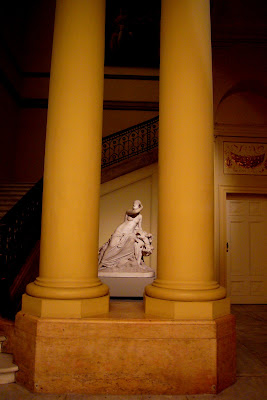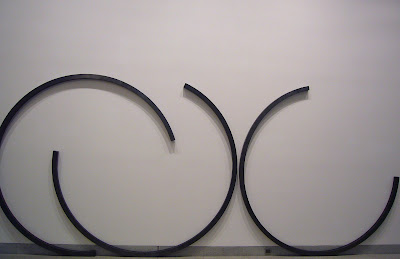24 December 2008
Image.
Imagine the human being as layers of spheres. These spheres are the way in which we experience the world in relation to ourselves. A sphere is a way in which we identify with the world around us. Some spheres are empty, some full. The division of experience into these different spheres is given by the culture into which one is born. For example, there is an ethical sphere wherein one can live as an ethical being, or a religious sphere in which one experience the world as being spiritual. Further examples, are a national sphere, an economical, aesthetic and intellectual sphere. Spheres can also be created, for example, only recently do we experience ourselves as ecological beings, with a certain place in nature and a designated proper behaviour. In the beginning, when a child is born, all spheres are empty. In the beginning the human being is nothing but potentiality, it can experience life in many possible ways. Surrounding people assert themselves over these spheres, they fill up the space with their actions and behaviour. Nobody actively copies someone else, nobody simulates another person, but the other simply acts in the spheres of someone that are empty. Thus a child is an extension of its parents. Because some of the spheres are full (i.e. filled by the ideas, behaviour or moods of the parents) and because other spheres are empty, the child can say or act in the mode of 'this and not this'. By being a this and not this, so by differentiating the full and the empty spheres, the 'I' is born: 'I am this and not this'. The 'I' is the relation between the spheres and character is essentially the pattern of tension between the full and the empty spheres. This 'I' can copy itself, for example, the religious being can assert itself into the ethical sphere, where one becomes an extension of oneself. Growth of character is either narcissistic (one sphere mirroring another sphere) or submissive (acting as the other). The natural flow of things is the filling of spheres, of oneself or of another human being.
Question.
The question is, should one go along or against this? Should we battle nihilism, the leaking of meaning from the spheres of our being? Should we allow values to spread endlessly until they have lost all intensity? More and more I see the purpose of leaving spheres empty. For example, there is a political sphere, in which I could experience myself as a political being, as the embodiment of certain political ideas and conditions. But I could also leave this sphere empty and deny that I am a political being. I could try not to identify with anything political whatsoever. I could embrace political nihilism and I could realize the created nature of political values. If this is possible, my character (the contrast between the different spheres of experience) would become more expressed, more articulated and intensified. And maybe, the political emptiness in my experience of the world could contain, preserve and contrast with my experience of the ethical fullness of life. Would political emptiness heighten my aesthetic experience of the world, would things become more beautiful when rid of political implications? And the same for the religious spheres of experience, does not the lack of religious meaning in my life carves me into who I am? Clearly, the emptiness and meaninglessness of our experience and behaviour identify us as much as the values we live by. Maybe it is something like a colored rubber band, stretch it and it will be become bleak and vague, contract it and the color deepens. What would happen if I stop asserting myself over others? What if I learn from contemporary art to appreciate the empty canvas? What if I accept the empty, the nihilistic and the boring in certain spheres of experience, carved out and neatly separated by the culture I live in? Is it possible to maintain layers of nothingness in myself and control them? Would I become worthless to others? Would I vanish from the flow of humanity or learn to direct it? Is the image I suggested a natural flow that one should embrace or something to be overcome?
11 December 2008
10 December 2008
01 December 2008
********************************************************************************
Most people divide music roughly into two groups: there is present-day music that is popular and which one listens to for fun (or with some nostalgia) and there are the classics or jazz musicians for the few with supposedly developed aesthetic taste. This division renders the aesthetically minded utterly disconnected from the time they live in. At the same, the contemporary minded only get bad copies of the past, unexpressive of the times we live in, while downloading destroys the elitism of avant garde art by making everything available. In order not to make the present a footnote to the past and to destroy the feeling of 'everything great lies in the past' (or 'has been done already'), I want to bring some attention to contemporary electronic artists of high aesthetic quality, i.e. the musical art of our days.
********************************************************************************
Please listen to the two songs below, 'Mt. Saint Michel' and 'Vordhosbn', made by Aphex Twins (also AFX).
Almost all electronic music works with loops, repeated sequences. The only way to appreciate electronic music is to learn to appreciate repetition and simplicity. Coming from jazz or classical music, where so much happens in the music, the electronic stuff often appears simply boring or empty. In this sense, I believe that the step from classical music to Aphex Twins is less difficult, because it is so extremely complex.
The repetition of electronic music is stark, it is precise repetition, perfect mirrorage. But from the different juxtapositions of these empty formulas, there emerges complexity and expression, if one so wants. One could compare the loops with empty scientific formulas which, when used in composition allow one to express reality or even create a reality (i.e. a model).
Mt Saint Michel + St Michael Mount
The world created by Mt. Sain Michel in my head, starts from the memory, the memory of religion and faith, of the calling church bells, the sound of the social community; yet also a sound ordering one to sit down and pray, the sounds of chains. This memorial sound is crushed by the aggresive beat, it is consumed by the overwhelming sway of the artifical. Soon the mechanic beats slowly silences, growing empty and leaving an empty wasteland. From this open space the melody arises, struggling to free itself from the repetition that captures it. It is the human voice, insecure with its new freedom, devasted with the emptiness that the destruction has brought about, clinging to the clockworks. Until it gives up and accepts the mechanic as given, accepting technology as its king. When we almost forgot about humanity, about the unpredictable, a voice arises, slowly fusing with the mechanical. Has the technology became human, or our humanity become technological? And what does it turn into? Is the sound a reflection of the church bells or is it the fragmentary that strives for continuity? What are you, anyways an emoticon or a product of the past?
Vordhosbn
What happens when the melody becomes beat and the beat becomes melody? In Vordhosbn I a constant interplay, an oscillation between the beat expressing melody and melody expressing the beat. There is the constant interplay between the fragmentary ideas, the bits that are supposed to express the reality around you, and the fullness of the world around; there is the everlasting tension between being determined by the world around you and you imposing carved up bits to carve up the world that surrounds you.
Although I have not done justice to the darker tensions of the music above, the rest will be more easy listening, more popular but great ways to get used to his sound and be ready for his more quirky stuff. Indeed it does take time to really appreciate the above, but isn't it exactly the same as with Mozart and the likes?
Windowlicker
Didgeridoo
Xtal [Turn Volume up]
Monkey Drummer [The Great Videoclip of Cunningham]







































